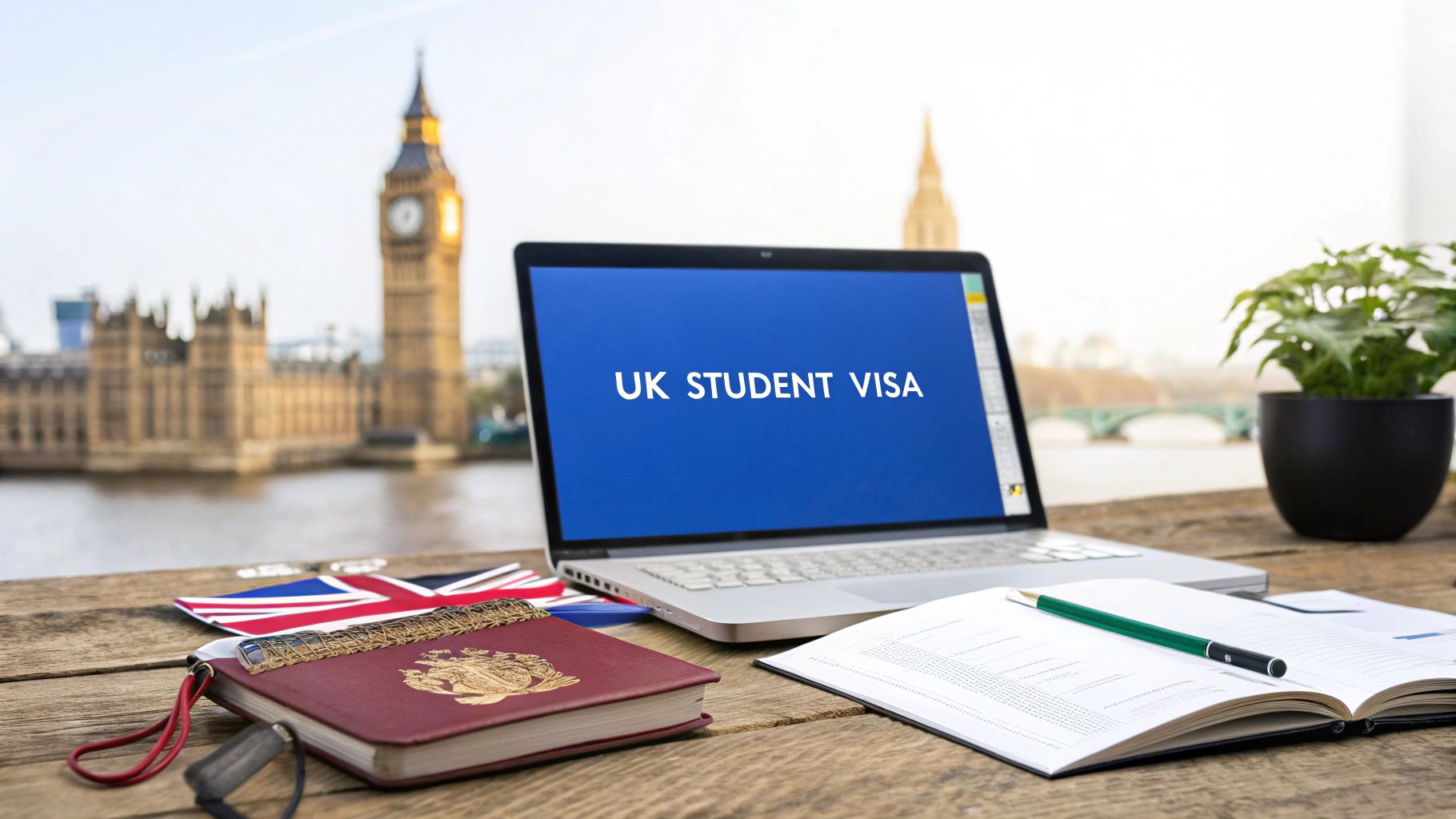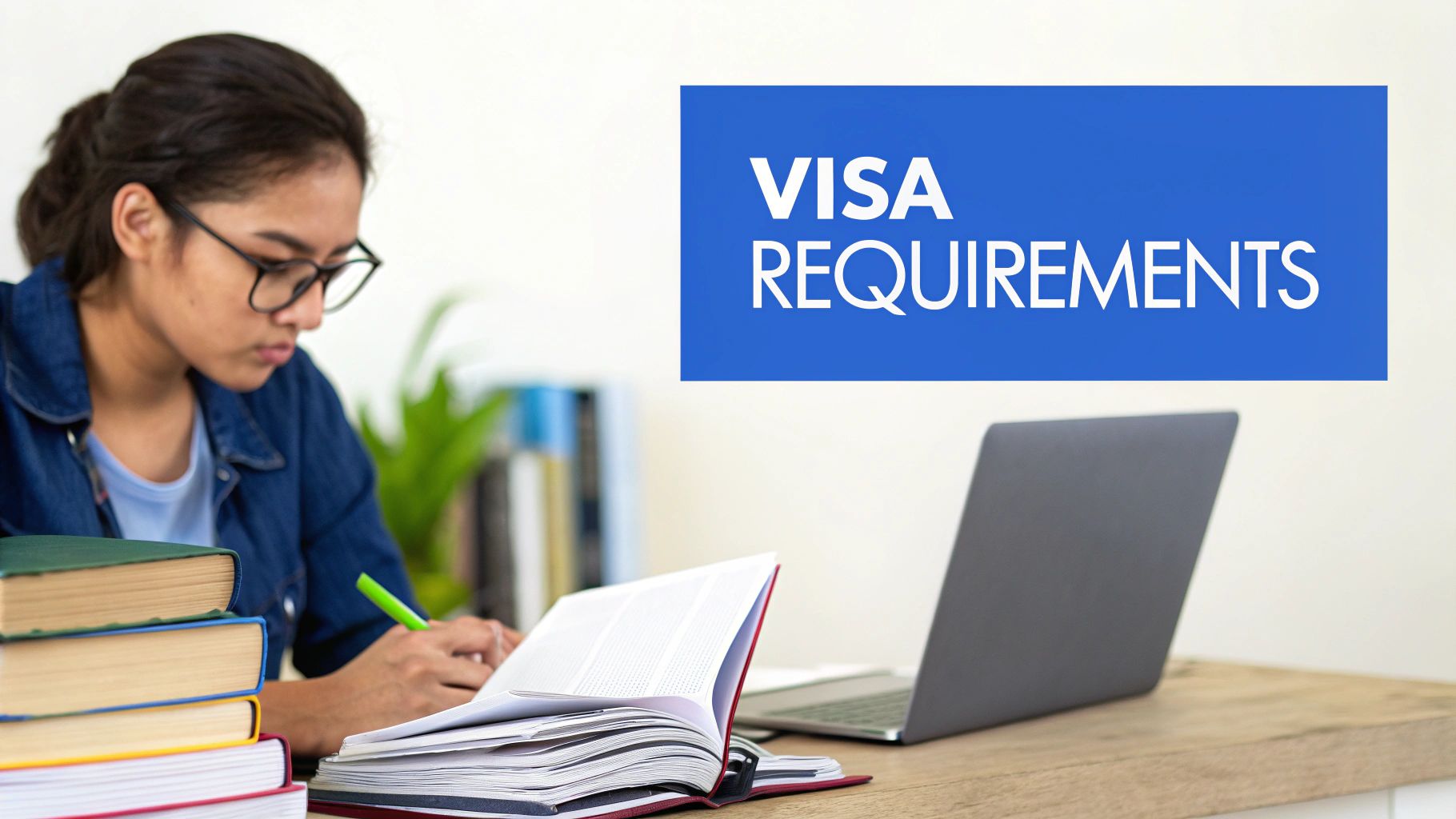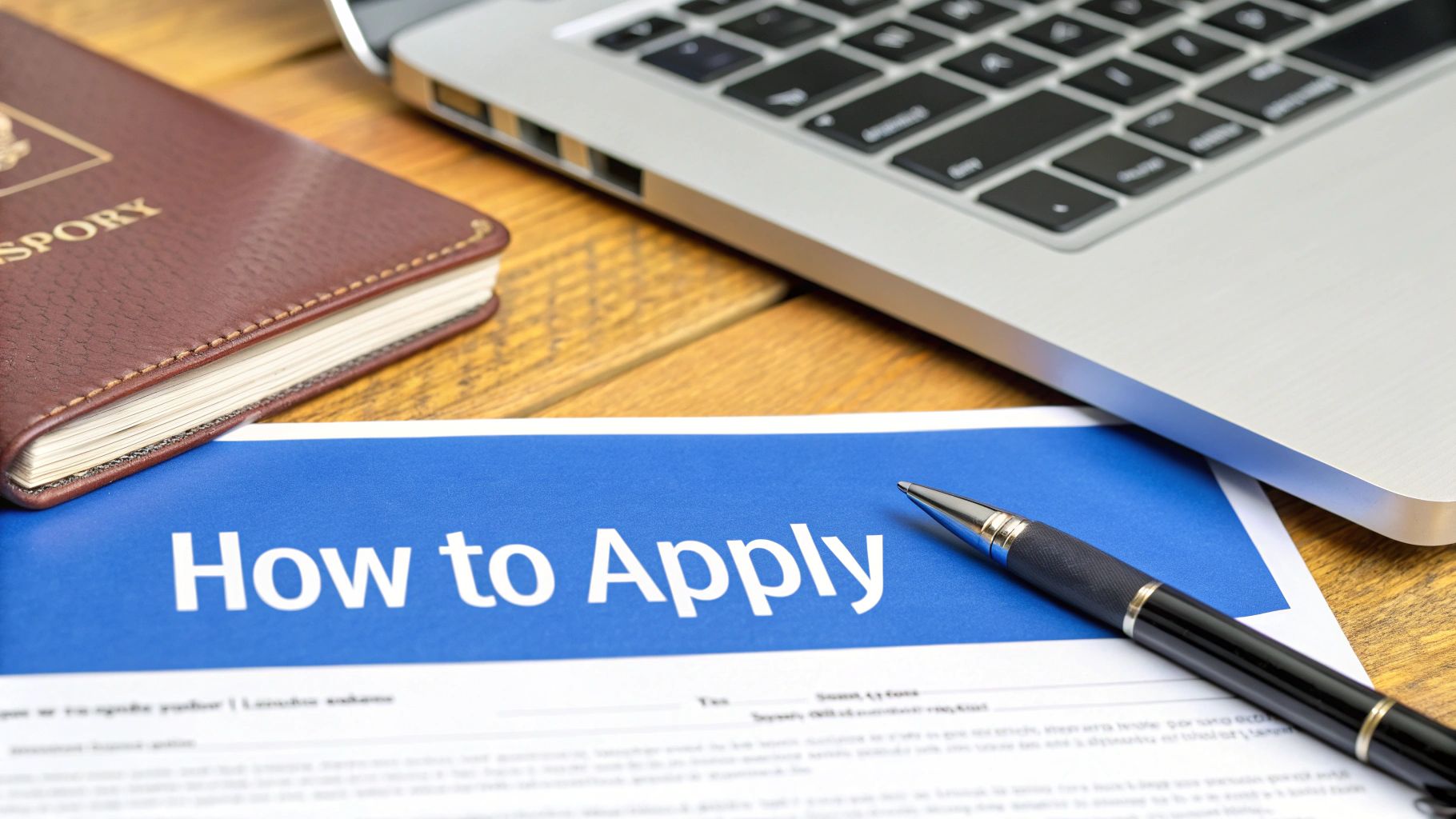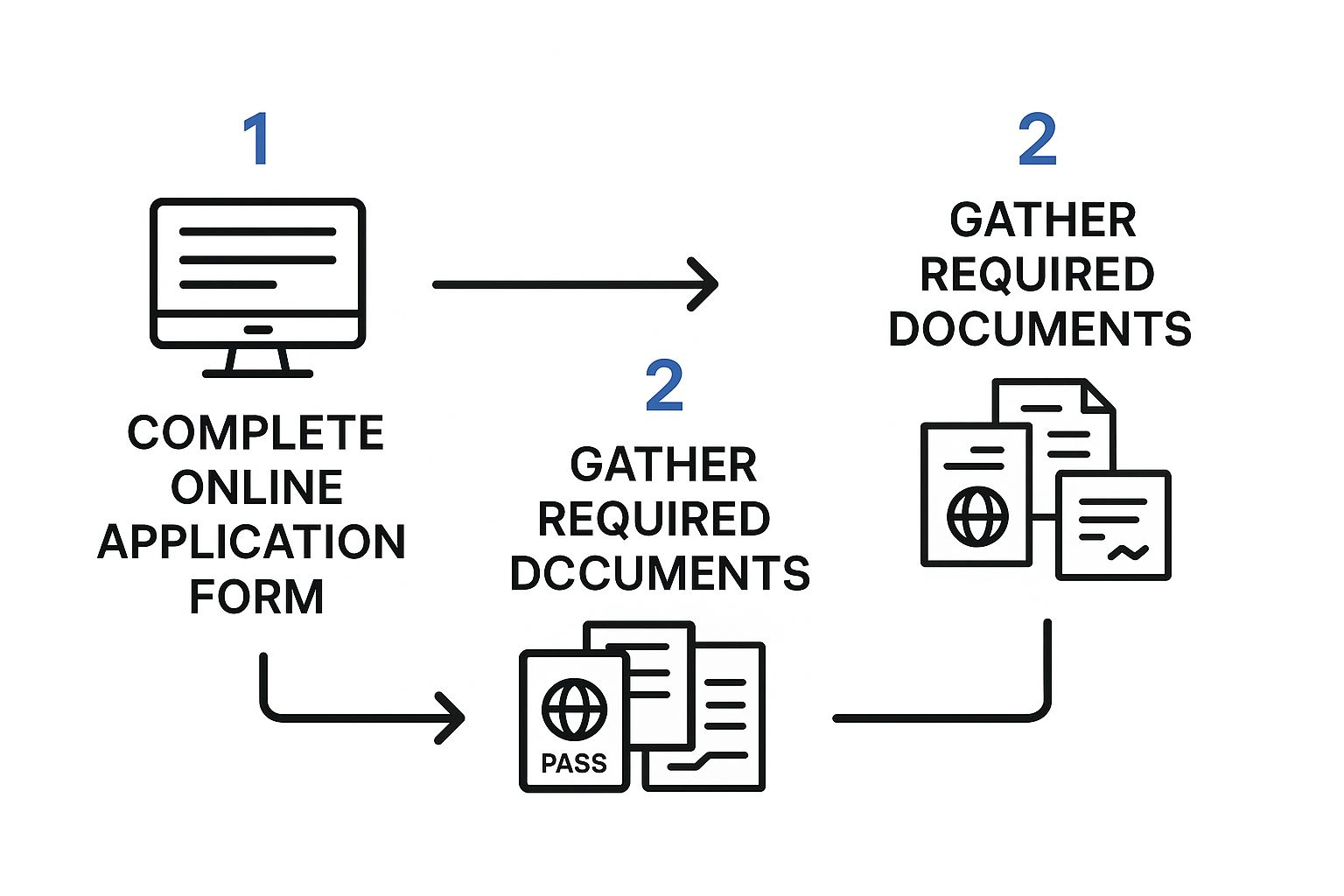Your Guide to the UK Student Visa Process

Getting your UK student visa is a journey, and honestly, it starts way before you ever see an application form. It’s a process that demands careful planning—from landing that university offer and sorting out your finances to gathering a very specific pile of documents. Only then can you even think about starting the online application.
What to Expect from the UK Student Visa Journey

The idea of studying in the UK is thrilling, but let's be real: the visa application can feel like a massive, confusing puzzle. With recent policy changes from the UK government, being prepared isn't just a good idea—it's absolutely essential. This guide is your reality check, designed to set clear expectations for what's coming.
The best way to tackle this is to see it as a series of milestones, not one giant task. Each step logically follows the last, starting from the excitement of getting your acceptance letter all the way to that moment of relief when your passport comes back with the visa inside. Thinking of it this way makes the whole thing feel much more manageable.
The Current Landscape for Nigerian Students
For Nigerian students, the ambition to study in the UK is as strong as ever, even with some new hurdles. The recent restrictions on bringing dependants for most master's students, for instance, have forced many to rethink their plans. It means your application has to be laser-focused on you as the student.
Despite these changes, the interest hasn't just held steady; it's grown. In the first quarter of this year, Nigerian applications for a UK student visa shot up by a staggering 64% compared to the same period last year. You can find more details on this trend in UK student demand reports. This shows an incredible determination from students, even when facing economic pressures and new rules.
Being part of this huge wave of applicants is motivating, but it also means there's no room for mistakes. Your application needs to be perfect to get noticed.
Key Takeaway: If there's one piece of advice I can give, it's this: be meticulous. Every single document, date, and detail is scrutinised. The Home Office doesn't offer much flexibility for errors, so being organised isn't just helpful—it's the key to success.
Key Milestones in the Visa Process
The UK student visa process is more than just an online form. It's a sequence of critical steps, and you have to get each one right. Here’s a simple breakdown of the main stages you'll go through:
- Securing Your University Offer: This is square one. Without an unconditional offer from a university that's a licensed student sponsor, you simply can't move forward.
- Receiving Your CAS: After you've accepted a firm offer and met all the conditions, your university will give you a Confirmation of Acceptance for Studies (CAS). This is a unique reference number, and it’s your golden ticket for the visa application.
- Sorting Out Your Finances: You need to prove you have the funds to cover your first year of tuition fees plus your living costs. The crucial part? This money must have been in your (or your sponsor's) bank account for at least 28 consecutive days before you apply.
- Completing the Online Application: This is where you'll enter all your personal details, your CAS number, and pay both the visa application fee and the Immigration Health Surcharge (IHS).
- Attending Your Biometrics Appointment: Once you've submitted your application online, you’ll have to go to a visa application centre in person to have your fingerprints and a photograph taken.
- The Waiting Game: This is the final and often most nerve-wracking part—waiting for UK Visas and Immigration (UKVI) to make a decision and send your passport back.
Going into this with a clear roadmap makes all the difference. When you know what's required at each stage, you can move from one milestone to the next with confidence, and that dramatically increases your chances of getting that visa.
Getting Your CAS and Proving You’re Eligible

Before you even touch the official UK visa application form, two things need to be sorted. First, you need to get your hands on a Confirmation of Acceptance for Studies (CAS). Think of this as the master key to your application; without it, the door to a UK student visa remains firmly shut.
Your CAS is essentially a unique reference number that your university provides once you’ve met all their academic and financial conditions and formally accepted their unconditional offer. It’s their way of telling the Home Office, "Yes, we’ve vetted this student, and they have a legitimate place to study with us." It’s the very foundation of your visa application.
Understanding the Points-Based System
The UK student visa works on a points-based system, which sounds more intimidating than it is. You need to score exactly 70 points to be successful. It’s not a test where you can get partial marks; it's a simple checklist where you either meet the criteria or you don't.
Here’s the breakdown of how you get those crucial points:
- Confirmation of Acceptance for Studies (50 points): This is the big one. Simply having that valid CAS from your university (a licensed student sponsor) bags you these points automatically.
- Financial Requirement (10 points): You have to prove you have enough money to pay for your course fees and your living expenses. This is a massive hurdle for many, so getting your documents perfect here is non-negotiable.
- English Language Requirement (10 points): You need to show you can understand and communicate in English to the level required for your course.
Nailing all three sections is the only way to get your visa. There’s no wiggle room.
From University Offer to Getting Your CAS
The time between accepting your place and getting your CAS can feel like you're stuck in limbo, but there's a lot happening behind the scenes. Your university is doing its final checks to make sure you’re a genuine student before they put their name on the line for you with the Home Office.
Usually, they’ll ask you to pay a deposit towards your tuition fees before issuing the CAS. This shows you’re serious. For instance, on a £16,000 tuition fee, a university might request a deposit of £2,000 to £4,000. The good news is that once paid, this amount is listed on your CAS, which reduces the total amount you need to show in your bank account for the visa application.
One of the most common pitfalls I see is students underestimating how long this process takes. Don't leave it to the last minute. Accept your offer, pay your deposit as soon as you're asked, and stay in regular contact with the admissions office.
Once the university is satisfied and your deposit is confirmed, they'll generate your CAS and email it to you. That email contains your unique CAS number and a summary of your course details. The moment it lands in your inbox, you’re officially ready to start the visa application.
A Note for Nigerian Applicants
The world of student immigration is always changing, and it’s so important for Nigerian applicants to keep up. While recent data showed a global surge in student visa applications by nearly 30%, the situation for Nigerian students has become more complex due to new UK policies, like the ban on bringing dependants. Knowing about these shifts is crucial.
Being aware of the current rules helps you build a stronger application that anticipates potential issues. For a complete rundown of everything you'll need, have a look at our detailed guide covering the latest UK student visa requirements.
Proving Your English Language Skills
Meeting the English language requirement is how you'll secure those final 10 points. For most degree-level studies, you'll need to demonstrate your ability at the B2 level of the Common European Framework of Reference for Languages (CEFR).
There are a few ways to tick this box:
- Take a Secure English Language Test (SELT): This is the most common path. Approved tests include IELTS for UKVI or Pearson PTE Academic UKVI.
- Rely on Previous Study: If you already have a degree from a majority English-speaking country (though this doesn’t include Canada), it can often be used as proof.
- Use a UK Qualification: A GCSE or A-Level in English from a UK school also works.
Your university will state exactly what they need in your offer letter. If a test is required, book it early, as test centres can get busy. Your CAS will ultimately confirm how you met the English language requirement, which is what the visa officer will check.
Getting Your Paperwork in Order: A Guide to Your UK Student Visa Documents

A successful UK student visa application is built on solid proof. This is where your careful preparation really shines. It's not just about ticking off a list; it's about understanding the why behind each document and ensuring every detail is perfect. The Home Office doesn't guess your intentions—your documents do the talking for you.
Think of it like building a case. Each piece of paper, from your passport to your bank statements, must be clear, correctly formatted, and tell a consistent story. Let's walk through exactly what you need, covering the absolute essentials and the specific documents that catch so many applicants out.
The Non-Negotiables: Your Passport and CAS
First things first, let's talk about the absolute basics. Your current passport or other valid travel document is the cornerstone of your application. It must have at least one completely blank page for the visa sticker (called a vignette) and needs to be valid for your entire planned stay in the UK. A good tip? If you have an old passport showing previous travel, it’s often smart to include a copy.
Next up is your Confirmation of Acceptance for Studies (CAS) number. As we've discussed, this isn't a physical letter but a unique reference number you'll get from your university via email. You'll receive a CAS statement outlining all the details. Your job is to check it obsessively. Make sure your name, date of birth, course title, and tuition fees are 100% correct. If you find a single mistake, contact your university's admissions team immediately to get it fixed before you submit anything.
I've seen applications refused for something as simple as a typo in a name on the CAS. Don't assume the university got it right. Be your own final proof-reader—it could save you a world of trouble.
Proving You Have the Funds
This is, hands down, the area where applications most often fall apart. The financial evidence rules are incredibly strict, with zero flexibility. You must prove you have enough money to cover two things:
- Your first year's tuition fees (the exact figure will be on your CAS).
- Your living costs for up to nine months. The Home Office sets this at £1,334 per month for London or £1,023 per month for courses outside London.
The golden rule here is that the total amount must have been held in your bank account (or your parent's/legal guardian's) for a minimum of 28 consecutive days. The statement you provide must be dated within 31 days of when you submit your online application. There are no exceptions to this.
Documents for Special Situations
Depending on your circumstances, you might need a few extra documents. Getting these sorted early will save you a massive headache later on.
- Tuberculosis (TB) Test Certificate: As an applicant from Nigeria, you are required to get a TB test. This isn't just any clinic; it must be one from the Home Office's list of approved test centres. The certificate is only valid for six months, so plan your test timing carefully.
- Academic Technology Approval Scheme (ATAS) Certificate: If you're enrolling in a postgraduate course in certain science and technology fields (like advanced engineering, physics, or AI), you'll likely need an ATAS certificate. Your offer letter will state this clearly. The ATAS application is free but can take several weeks to process, so apply for it the moment you know you need one.
- Parental Consent: For applicants who are 16 or 17 years old, you must provide a letter of consent from your parents or legal guardians. You'll also need to include proof of your relationship, such as your original birth certificate.
To help you keep track, here’s a quick-reference table of the most critical documents you’ll need to gather.
Essential UK Student Visa Document Checklist
Putting together your document portfolio requires precision. This table breaks down the core items, what to look for, and the common pitfalls to avoid.
| Document | Key Requirement/Format | Critical Note |
|---|---|---|
| Passport | Must be current, valid, and have at least one blank page. | Double-check the expiry date. If it’s due to expire during your course, it's best to renew it before you apply for the visa. |
| Financial Evidence | Bank statements or a formal letter from your bank proving funds were held for a consecutive 28-day period. | The final date on the statement must be within 31 days of your application submission. The 28-day rule is iron-clad. |
| TB Test Certificate | Required for residents of Nigeria. Must be from a Home Office-approved clinic. | The certificate is only valid for 6 months. Booking your test too early can lead to it expiring before you apply. |
| Original Academic Certificates | The qualifications listed on your CAS (e.g., your degree certificate, transcript, WAEC results). | You’ll need the original physical copies. You may be asked to show them at your biometrics appointment, so keep them safe. |
| English Language Test | Your IELTS for UKVI or another approved Secure English Language Test (SELT) certificate, if your university requires it. | Ensure your test is the specific "for UKVI" version if needed. Standard academic tests are often not accepted for visa purposes. |
Treat this process with the seriousness it deserves. Create a physical folder and a corresponding digital one on your computer. As you secure each document, check it off your list. This level of organisation is what separates a smooth, successful application from a stressful, uncertain one.
Navigating the Online Application and Fees
This is it. After all that work gathering your documents, it’s time to tackle the official GOV.UK online portal. Think of this as more than just filling in a form; you're presenting your case to the Home Office, and every detail matters.
The online application is your formal request for a UK student visa. Every field, from your personal details to your study plans, has to be spot-on. I’ve seen applications get held up for weeks over simple mistakes like a mistyped passport number or a wrong date. So, my best advice is to take it slow. Have your documents right beside you and double-check every single entry.
Starting the Online Form
Your journey begins on the official GOV.UK website. The first thing you'll do is create an account. This is a lifesaver because it lets you save your progress and come back later. Don’t feel you have to get it all done in one go.
The form will walk you through a series of questions about who you are, your CAS number, where you’ve travelled, and your family. Honesty is non-negotiable here. If you've ever had a visa refused for any country, you absolutely must declare it. Trying to hide something like that is a critical error and could sink your entire application.
Here’s a simple visual to keep the main stages in mind.

It’s a straightforward path from filling out the form to gathering your documents and hitting submit, but each step needs your full attention to keep things moving smoothly.
It's worth noting that the landscape has been changing. Recent UK Home Office data reveals a shift, with Nigeria now fourth in the number of sponsored study visas granted, sitting behind India, China, and Pakistan. This comes after a 14% drop in total study visas issued globally and a massive 84% decrease in dependant visa applications from Nigeria, thanks to new government rules. What this tells us is that the focus is now squarely on the individual student.
Understanding the Financial Commitments
When you get to the end of the form, you’ll need to make two key payments online. As long as you’ve planned for them, there won’t be any last-minute surprises.
- The Visa Application Fee: This is the standard cost for processing your student visa application. Right now, it’s £490 if you’re applying from outside the UK.
- The Immigration Health Surcharge (IHS): This is a compulsory fee that gives you access to the UK's National Health Service (NHS). You have to pay this for the entire length of your visa, all at once.
The IHS can be a significant cost, so you need to budget for it accurately. The current rate is £776 per year of your visa's duration. For example, if you're on a three-year degree, your visa will probably be valid for a little longer, perhaps three years and four months. You'll be charged the IHS for that entire period. The good news is the online form has a built-in calculator that does the maths for you based on your course dates.
A quick tip from experience: Have your debit or credit card ready before you get to the payment page. The system takes most major cards, but make sure you have enough funds and that your bank has cleared your card for international payments. A failed transaction can sometimes cause the system to glitch.
Finalising and Submitting Your Application
Once you've filled everything out and paid the fees, the system will let you download a copy of your application form and a document checklist. Print both of these right away. You’ll need to take them with you, along with your original documents, to your biometrics appointment.
Clicking that ‘submit’ button is a huge milestone. You've officially navigated the portal, provided your information, and paid your dues. For a broader look at the entire process, you can also check out our detailed guide on how to apply for a student visa. Next up is booking that appointment at a Visa Application Centre to give your fingerprints and have your photo taken.
Preparing for Your Biometrics Appointment
Once you’ve hit ‘submit’ on the online form and paid the fees, you’ll reach the next major hurdle: your biometrics appointment. This is a non-negotiable step where you'll visit a Visa Application Centre (VAC) to have your photo and fingerprints taken. It’s the final piece of the puzzle before your application is formally sent off to UK Visas and Immigration (UKVI) for a decision.
As soon as you submit your online application, the system will prompt you to book this appointment. My advice? Don't put it off. Appointment slots, especially during the peak season from July to September, get snapped up incredibly quickly. Booking straight away ensures your application keeps moving forward without any frustrating delays.
Booking Your Slot and Choosing a Service Level
When you go to book, you'll be presented with a few service options, and honestly, it can be a bit confusing. It’s really important to know what you’re paying for, as your choice has a direct impact on how long you’ll be waiting for that all-important decision.
- Standard Service: This is the default. Officially, the processing time is around three weeks. In reality, during busy periods, it can take longer.
- Priority Visa (PV): For an extra fee, this service aims to get you a decision within five working days. It’s a great option if your course start date is looming or if you just want to shorten that anxious waiting period.
- Super Priority Visa (SPV): This is the speediest option, usually promising a decision by the end of the next working day. The cost is substantial, so it’s typically reserved for genuine emergencies.
Keep in mind that the availability of these premium services can change depending on your location and the time of year. Have a good think about your course start date and your own peace of mind. If your flight needs to be in less than a month, paying for a priority service is often a smart investment.
What to Expect on the Day
Walking into the VAC can feel a little intimidating, but knowing the drill makes it a much smoother experience. Aim to get there about 15-20 minutes before your scheduled time. Arriving any earlier is usually pointless, as they likely won't let you in. You'll pass through a security check and then wait to be called to a counter to hand over your documents.
The staff at the VAC are collectors of information, not decision-makers. Their job is to check your paperwork is all there, take your digital photo, and scan all ten of your fingerprints. A quick tip: make sure your fingertips are clear of any cuts or decorations like henna, as this can mess with the scanner.
Here’s a simple piece of advice I always give people: dress reasonably well. There’s no strict dress code, but the photo they take will be on your Biometric Residence Permit (BRP) for years to come. Think of it like a photo for a new passport or driving licence.
Organising Your Documents for the Appointment
Trust me, you don’t want to be that person frantically digging through a messy pile of papers. Being organised is key. Get a simple folder and arrange your documents in a logical order before you leave home.
Here’s a practical stacking order that always works well:
- Your appointment confirmation printout on top.
- The printed copy of your full application form.
- Your current passport, plus any old ones you mentioned in the application.
- The original copies of all supporting documents, such as your academic certificates, TB test results, and the financial evidence you’ve prepared.
Having everything in order just makes the process quicker and less stressful for everyone involved. And remember, the UK immigration rules can and do change, particularly around dependants, so make sure your knowledge is up-to-date. This kind of diligence marks you out as a serious, organised applicant.
Once your biometrics are captured and your documents are accepted (either physically or by being scanned), your application is officially on its way to the UKVI. Now, the waiting game begins. You’ll be given a receipt—hang onto this, as you'll need it for tracking your application and eventually collecting your passport.
Your Top UK Student Visa Questions, Answered
Let's face it, even when you think you've got everything sorted, the UK student visa process can throw a few curveballs. It’s completely normal to have nagging questions. Getting them answered clearly is the best way to keep your stress levels down and your application moving forward.
I’ve pulled together the most common and urgent questions I get from applicants, with the straight-up, practical advice you need to navigate these tricky spots.
How Do I Actually Prove I Have Enough Money?
This is the big one. It's the number one reason I see for visa refusals, and the Home Office is incredibly strict here. You must prove you have enough cash to cover your first year of tuition fees plus your living expenses.
The magic numbers are £1,334 per month for London and £1,023 per month outside London, calculated for a maximum of nine months.
The real trap, though, is the timing. That money must sit untouched in your account (or your parent's/legal guardian's account) for a solid, unbroken 28 consecutive days. I’ve seen applications fail because the balance dipped for just one day. It’s an automatic refusal, no exceptions.
Expert Tip: The Home Office only cares about the closing balance on your final bank statement. Make sure this statement is dated no more than 31 days before you hit 'submit' on your online application. Check your dates, then check them again.
What Are the Real Rules for Working on a Student Visa?
Yes, you can work, but you need to be very careful. If you’re studying a degree-level course at a recognised university, you can typically work up to 20 hours per week during term time. When the university is on an official holiday break, like over Christmas or summer, you're free to work full-time.
But be warned: if your course is below degree level, the rules are often much tighter. You might be limited to just 10 hours a week, or sometimes you can't work at all.
Your Biometric Residence Permit (BRP), which you'll get after you land in the UK, spells out your work conditions in black and white. Never, ever go over these hours. It's a serious breach of your visa conditions and can jeopardise your entire stay in the UK.
What Should I Do If My Visa Is Refused?
First things first: breathe. Don’t panic. You'll get a formal refusal letter that explains exactly why the decision was made. Your first job is to read that document, word for word, several times.
- Was it their mistake? If you believe the caseworker made a clear error—maybe they missed a document you definitely included—you can apply for an Administrative Review. This isn't a fresh appeal; it’s simply a request for them to double-check their work for mistakes.
- Was it your mistake? If the refusal was because of an error on your part, the only way forward is a completely new application. You’ll have to fix every single issue mentioned in the refusal letter.
Your university's international student advisor is your lifeline here. Speak to them immediately before you do anything else.
Can My Family Still Join Me in the UK?
This is where things have changed dramatically, and it's a huge factor for many Nigerian applicants. The rules have become much, much tighter.
Right now, only students enrolled in postgraduate research programmes (like a PhD or another research-based higher degree) can bring dependants—meaning a spouse, partner, or children under 18—with them to the UK.
If you are studying a taught Master's, an undergraduate degree, or any other course, you can no longer bring your family with you on a dependant visa. Research has shown that visa applications from Nigerian students dropped by nearly 70% in the first half of 2024, a direct result of this policy change.
Always check the latest official guidance on the GOV.UK website yourself, as this rule is enforced without any exceptions.
Feeling the pressure of the visa process? JapaChat can help. As Nigeria's first AI immigration expert, we give you instant, accurate answers to all your urgent questions, so you can plan your move with confidence. Get personalised checklists and expert guidance to avoid making expensive mistakes. Sign up for free and start your journey with a trusted partner at JapaChat.

Leave a Reply